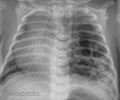A new oral drug caused dramatic shrinkage of a patient's rare, aggressive form of soft-tissue cancer that was driven by an abnormally activated protein

The findings also highlight the value of "personalized medicine" gene-testing strategies to predict the best drug treatment for an individual's particular, genetically defined cancer.
The patient described in the NEJM Brief Report is a 44-year-old man diagnosed in 2007 with inflammatory myofibroblastic tumor (IMT), a type of sarcoma that typically develops in the chest or abdomen in children and young adults.
In approximately half the cases of IMT, ALK is fused to a different protein in the patients' cancer cells, spurring cancer development. The patient had been treated with standard chemotherapy drugs followed by the targeted compound Gleevec, but the cancer returned in the form of multiple tumors.
James Butrynski, MD and Geoffrey Shapiro, MD, PhD, Dana-Farber oncologists and the first and senior authors of the report, respectively, offered the patient participation in a Phase 1 trial of an experimental drug, crizotinib, which blocks ALK activity, as well as that of another oncogene, MET, that is abnormally activated in a number of cancers.
Crizotinib treatment shrank the tumors by more than 50 percent - technically called a "partial response." After several months of crizotinib, in December 2008, some of the tumors became resistant to the drug and started growing again. These tumors, as well as tumors still responsive to crizotinib, were removed surgically. Crizotinib was resumed after the surgery, and the patient remains without evidence of disease as of September 2010, according to the investigators.
Advertisement
Researchers from Massachusetts General Hospital, Dana-Farber/Brigham and Women's Cancer Center, and other hospitals gave crizotinib to 82 patients after standard drugs failed to halt the tumors' growth. As part of the personalized medicine effort ongoing in the Dana-Farber/Brigham and Women's Cancer Center Thoracic Oncology Program, patients with abnormal ALK were identified for the trial, underscoring the importance of tumor profiling to match drug with patient.
Advertisement
The study has been reported in the Oct. 28 issue of the New England Journal of Medicine.
Source-ANI















